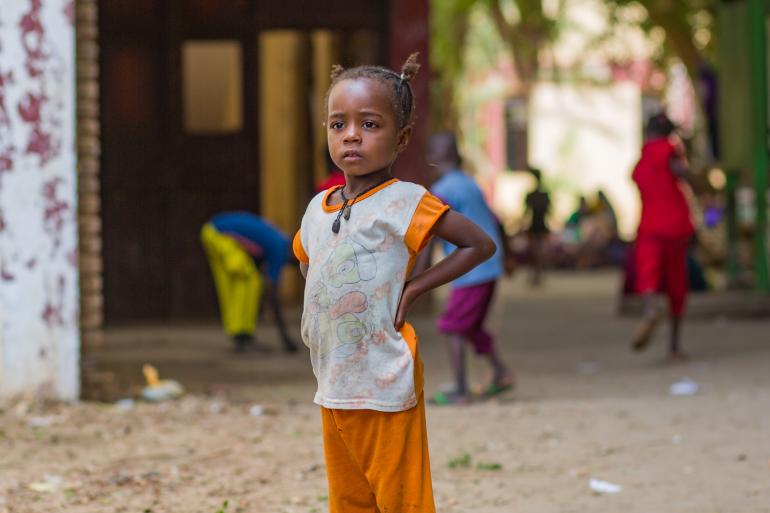
Sudans War Causes Psychological Trauma
Mariam Abashar
Any war means death, destruction, creating disabilities and impairments, depression, despair, and anxiety, all of which are harsh psychological consequences resulting from a war that may be ignited by two people on a whim, but they do not have the power to stop it once it erupts and spirals out of control.
Most Sudanese, especially in the capital Khartoum, are probably experiencing the atmosphere of a brutal war, which its perpetrators described as a senseless war, for the first time in their lives (aside from what they watch on television). The war in Sudan that began in mid-April, more than six months ago, between the army and the Rapid Support Forces, has had more terrifying effects than all the regional wars combined that lasted for years. This is because it has personal and devastating implications for the Sudanese citizens themselves.
Life Disruption
The war disrupts all aspects of life, social, mental, and political, due to the destruction and devastation it creates, and the loss of friends, loved ones, neighbors, relatives, colleagues, and dear ones. It also destroys the environment and pollutes the air and people, negatively affecting an individuals health.
Dr. Mohamed Nooh Mohamed Ahmed, a psychiatric consultant and a professor at universities, says that due to the comprehensive destruction of important cities, it is expected that the war will have long-term effects on the already weakened Sudanese economy. Nooh points out that the war leaves devastating effects on children, a group that should have been given priority as they are the future of Sudan and its capital. There are two types of children, according to the specialist. One is uninformed and unaware of what is happening, usually under six years old, and another type that is older, informed, and aware of their surroundings, asking many questions and wanting answers. This type needs to be dealt with differently, and he indicates that children express their feelings in different ways, such as crying and screaming, because they do not have the vocabulary to understand a war of this magnitude and cannot analyze it. Sometimes, symptoms of some diseases, such as seizures, may increase in them. Additionally, the war hinders the provision of necessities for children and their families, such as food, shelter, healthcare, and education, which affects their physical, mental, academic, and emotional growth, as well as their difficulty in integrating into society and their inability to build emotional bonds with others.
Terrifying Effects
One of the terrifying consequences of the war on children is the constant feeling of fear, anxiety, depression, and despair, along with behavioral disorders that manifest in aggression, bed-wetting, and reverting to old habits they practiced when they were younger, like sucking their fingers. In addition, witnessing killings, sniping, and the scattering of corpses and their limbs on the streets, as well as hearing the whizzing of planes and the rumbling of cannons, missiles, and launchers, all lead to psychological and physical traumatic events for children.
Psychological Wounds
Survivors of death are another group greatly affected by the war, with deep wounds in their souls, bodies, and spirits that are difficult to easily heal. According to the psychiatric specialist, survivors recall the sounds of bombs, the whizzing of planes, the rumbling of missiles, and images of scattered corpses and dogs tearing them apart. All of this replays like a renewed tape, causing deep psychological traumas for them.
Psychologists have emphasized the importance of working on psychological treatment and support for those affected by providing training for qualified staff, conducting educational training courses, and offering psychological treatment services by trained doctors to monitor and treat cases. They pointed out that the number of psychiatric specialists in Sudan is insufficient to face the crisis. Dr. Nooh advises utilizing the experiences of other countries, such as Jordan, to address the impact of displacement, refuge, mobility, estrangement, and mourning for what they have lost. Survivors suffer from all types of hardship and think that psychological support is a luxury, not a priority for taking their children to psychiatrists, especially since the general public is more concerned with treating surgical injuries, fractures, and bleeding. However, the effects of psychological trauma are not noticeable now, but they will have huge long-term effects, which is why international organizations pay great attention to the psychological aspect.
Treatment Methods
Dr. Nooh called for broadcasting educational and awareness programs through television, radio, and various social media platforms. He also suggested training volunteers in schools, equipping children with coping skills for different environments and emergencies, and making it a part of the curriculum. He urged parents to observe their childs behavior, such as aggression, depression, nightmares, declining academic performance, and high sensitivity when opening doors and ringing phones, as these are signs of increased stress.
Important Messages
Dr. Malaz Zaroug, an expert in psychiatry, pointed out that the war in Sudan represented an extraordinary event for most Sudanese, especially in Khartoum state. The accompanying horrific violations against women and children have left a harsh imprint on the souls of those who were victims. In addition, scenes of bodies found on the side of the road and images of the war, including fires and destruction, represent a terrifying psychological trauma. She believes that parents of children, especially, need to be calm and avoid anxiety because children are more anxious. She added that it is important to reassure them, embrace them, especially those who do not understand, while explaining what is happening to older children instead of leaving them to their analyses, which may harm them. She also reassured them that the war will end and will not last forever, and that things will get better than they were before. She considers messages of safety and reassurance to be the basis for psychological stability, especially for young children and adults.

